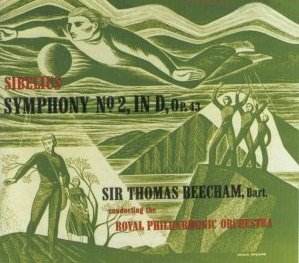Beecham took up Sibelius's music long after he took
on the role of Delius's crusading angel. This happened in the 1930s
with Beecham following in the tracks of Wood, Bantock and Cameron. It
did not taker him long to leave all of them behind in the snow. Boult
also discovered Sibelius in this decade and his own orchestra can be
heard here. There is the softest of ironies that these later discoveries
happened at a stage when the composer was all but finished creatively.
Biddulph here present commercially released recordings
- three from the immediate post-war period and one from the mid-thirties.
The Tempest vignettes were still paint-wet when recorded and
they make a delightful impression contrasting in their wan exploratory
probing grace with the proto-brutality of the Prelude/Storm.
The Oak Tree perhaps gives hints of the way his Eighth Symphony
would have sounded. They were recorded shortly after the UK premiere
of a selection of Tempest scenes at the 1934 Leeds Festival.
The 78s were only ever issued in the USA and copies are not numerous.
These are therefore valuable as documents close to contemporary with
the premiere in the mid-1920s. The sound quality is perceptibly less
open than that of the other tracks but the mind's ear soon adapts. They
were recorded by Walter Legge using a mobile unit driven up from London
to Leeds.
Karelia: The Intermezzo must have been
marked accelerando if Beecham's sprint is anything to go by.
He vies with Ormandy's 's Lemminkainen's Return (on Biddulph
WHL 062). The alla marcia is taken at a pace most will recognise
but the jerk-accenting is special as is the furious verve of the winds
especially the flutes. It is this elemental violence that also blasts
into the marrow of the flute tone in the RPO's 1946 Tapiola.
The steely gale and steam-whistle lightning slash at 16.04 has never
been excelled to best of my knowledge. This is the calibre of evenet
that Decca would have captured if only they had continued the 1972 Suisse
Romande, Horst Stein sessions; the ones that produced the outstanding
Sibelius tone poem collection of the 1970s (Pohjola, En Saga,
Nightride, Finlandia). One can only lament that Beecham
did not record Nightride and Sunrise, Luonnotar, Kullervo,
En Saga and that there is no Beecham Third or Fifth Symphony
and that his EMI Seventh is so pulseless.
A dozen years and a world war later Beecham we
encounter Beecham in the Second Symphony. This is very satisfying if
not outstanding. Note the plaintive meaning lent by Beecham to woodwind
at 3.33 in the first movement. In the second movement I noticed a brass
band warble in the trumpets - had never heard that before. The orchestra
do not give the sort of blade-edge precision as the Philadelphians of
Ormandy and Stokowski in another Biddulph issued at the same time as
this disc. Beecham certainly demonstrates a skilled architectonic control
in 5.40 of the finale of symphony. However overall this does not buzz
and sizzle as much as his 1954 Royal Festival Hall performance complete
with Beecham's hoarse shouts of climactic encouragement. The effect
in comparison is like hearing the Elgar Cello Concerto in the lauded
Barbirolli EMI studio performance and then comparing it with the oft-disdained
unruly combustible passion of Dupré's Philadelphia recording
for CBS-Sony.
First class English-only notes by Malcolm Walker. Thanks
go to Richard Kaplan, Michael Gartz and Don Tait for the loan of the
source material.
Rob Barnett


